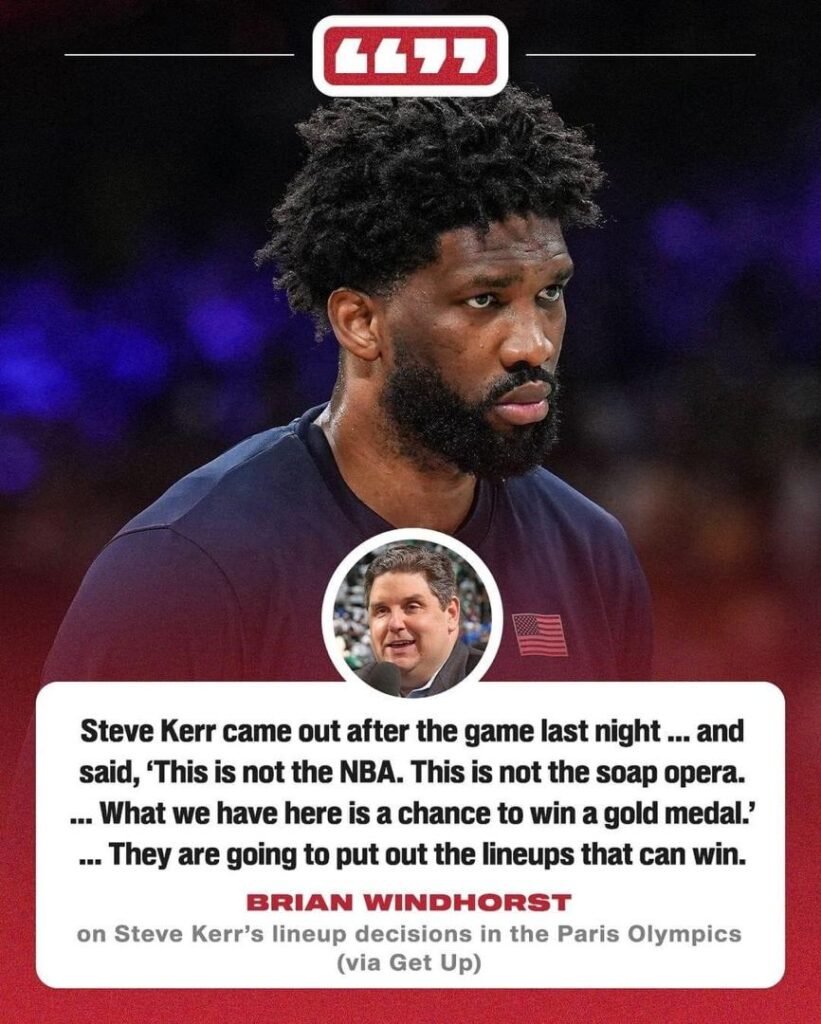
In the highly anticipated USA vs. Sudan match up, basketball fans were eager to witness a display of top-tier talent and strategic game play. However, the game took an unexpected turn when Joel Embiid, one of Team USA’s most formidable players, publicly expressed his deep dissatisfaction with Coach Steve Kerr’s decisions regarding his playing time.
Joel Embiid, the Philadelphia 76ers’ star center and a key player for Team USA, was surprisingly benched for a significant portion of the game. Despite his impressive performance in previous matches and his established reputation as a dominant force on the court, Coach Steve Kerr’s decision to limit Embiid’s minutes has left fans and analysts alike baffled.
Embiid, known for his competitive spirit and passion for the game, was visibly frustrated on the sidelines. In post-game interviews, he didn’t mince words about his disappointment, suggesting that his talents were being wasted on the bench. “I felt I could have made a real difference out there,” Embiid said. “It’s frustrating to sit and watch when you know you can contribute.”
The controversy reached a boiling point when Anthony Davis, another key player for Team USA, suffered an ankle twist during a critical moment in the game. With Davis unable to continue, many expected Embiid to step up and fill the void. Given Embiid’s exceptional skills and readiness to perform under pressure, his substitution seemed like the obvious choice.
However, Coach Kerr opted for a different rotation, leaving Embiid on the bench. This decision has been heavily criticized, with many arguing that Embiid’s presence on the court could have altered the outcome of the game. Embiid himself has expressed that he felt overlooked during a crucial time when his team needed him the most. “I was ready to go. I was prepared to step in and help my team, but the call never came,” Embiid remarked.
Coach Steve Kerr is known for his strategic mindset and his ability to manage a team’s dynamics effectively. His decisions are often aimed at balancing the team’s strengths, managing player fatigue, and maintaining harmony within the squad. However, in this particular instance, many believe that Kerr’s strategy backfired.
Critics argue that Kerr’s decision not only undermined Embiid’s confidence but also potentially compromised the team’s performance against Sudan. The game, which ended in a narrow victory for Team USA, could have been more decisively won had Embiid been given the chance to contribute more significantly.
Joel Embiid has never been one to hold back his feelings, and this situation was no exception. His dissatisfaction with Kerr’s decisions was palpable, and he made his frustrations known in no uncertain terms. Embiid emphasized that he was ready and eager to step up when Davis went down, and his exclusion felt like a personal slight.
“I’m here to play, to help my team win. Sitting on the bench when I know I can make a difference is tough to swallow,” Embiid stated. His bold comments have sparked widespread debate about the dynamics between players and coaching staff, highlighting the importance of trust, communication, and mutual respect in high-stakes games.
The incident has shone a light on the often delicate relationship between players and coaches. While coaches like Kerr have the responsibility of making strategic decisions that benefit the team as a whole, players like Embiid must feel valued and trusted to perform at their best. When a player of Embiid’s caliber feels overlooked, it can lead to a rift within the team, affecting morale and performance.
Embiid’s public airing of his grievances also brings to the fore the role of star players in a team. Star players often have significant influence, and their satisfaction with their roles can impact team dynamics. Kerr’s decision to bench Embiid during a crucial moment might have been driven by a broader strategy, but it clearly did not align with Embiid’s expectations and readiness to contribute.
The repercussions of this incident are likely to be felt in the coming games. Coach Kerr and Team USA will need to address this internal conflict to ensure it does not impact their performance in future matches. Building a cohesive team where all players feel valued and heard is essential for success on the international stage.
Embiid’s outspoken stance might also prompt a reevaluation of how player roles are communicated and managed within the team. Effective communication between the coaching staff and players is crucial to ensure that everyone is on the same page and working towards a common goal.
As the dust settles from the USA vs. Sudan game, the tension between Joel Embiid and Coach Steve Kerr raises important questions about team management and player utilization. Was Embiid justified in his frustration, or did Kerr’s strategic approach hold merit? This incident has ignited a broader conversation about the balance between coaching decisions and player satisfaction.
Embiid’s outspoken stance has shone a spotlight on the often complex relationships within a team, where the balance of power, trust, and respect must be carefully managed. The repercussions of this controversy will undoubtedly be felt in future games, with fans and analysts eager to see how Team USA will address and move past this internal conflict.
In the end, whether this incident will lead to a stronger, more united team or further divisions within the ranks remains to be seen. What is certain is that Joel Embiid’s determination to play and contribute will continue to drive his performance, and the decisions made by the coaching staff will be under intense scrutiny going forward.



